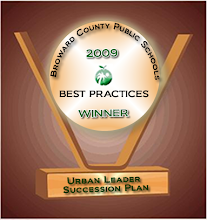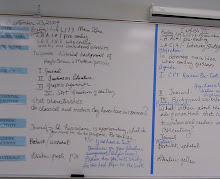The 2008 Florida Legislature passed Senate Bill 1908 - School Grading on June 30, 2008. This bill requires the State Board of Education to replace the Sunshine State Standards with “Next Generation Sunshine State Standards” by December 31, 2011. Click the following to review the enrolled version of the bill.
THE MISSION OF THIS INITIATIVE
- Higher expectations
- More rigorous curriculum
- Respond to students needs
- Ensure students are prepared for college and or a high-skills high-wage work force
- Increase the number and percentage of students who graduate from high school "college and career ready"
- Better communicate with 11th grade students and their parents the requirements and opportunities for enrollment in college-credit courses without a need for remediation,
- Provide students, whose test scores in Reading, Writing and/or Mathematics indicate any gaps, an opportunity to attain needed competencies in 12th grade prior to high school graduation.
- School Grading, Alternative School Improvement Rating System, School
- College Readiness
- Assessment
- FCAT Preparation Activities
- Electronic Personal Education Planner (ePep)
- Arts Requirement for High School Graduation
- Standard High School Diploma Designations
- Dual Enrollment
- Individuals with Disabilities Education Act (IDEA)
- School Advisory Council (SAC) Membership
- Teacher CertificationCorporate Tax Credit (CTC) Scholarship Assessments
- Test of Adult Basic Education (TABE)
- Florida Ready to Work Credential
- Florida Teachers Lead Program
- Cafeteria Sanitation Certificate
Goals for ADP
- Align high school standards and assessment with the knowledge and skills required for success after high school
- Require all graduates to take rigorous courses aligned to college- and work- ready standards that prepare them for life after high school
- Streamline the assessment system so that tests students take in high school also serve as placement tests for college and hiring for work
- Hold high schools accountable for graduating students who are ready for college or careers and hold postsecondary institutions accountable for students’ success once enrolled.
As of the 2009-10 school year, 50% of a school's grade will be based on the existing FCAT scores of students and the other 50% will be based on:
- The school's graduation rate
- Participation and performance of students in Advanced Placement (AP), International Baccalaureate (IB), dual enrollment, Advanced International Certificate of Education (AICE), and achievement industry certification courses/programs
- Post-secondary readiness of students as measured by the SAT, ACT, or CPT
- The school's "at-risk" graduation rate
- Performance of students on statewide standardized end of course assessments, as they become available.
- Growth or decline in the elements above from year to year.
GENERAL IMPLEMENTATION TIMELINE
The State Board of Education’s approved timeline is available at http://www.fldoe.org/board/meetings/2008_06_17/Next%20Gen%20Stan.pdf.
GENERAL IMPLICATIONS
Ultimately, this legislation is intended to help graduate better prepared students, increase access to postsecondary opportunities, enhance career success, and promote student retention and completion in college.
POST YOUR THOUGHTS
What are the implications of Senate Bill 1908 at your level?








